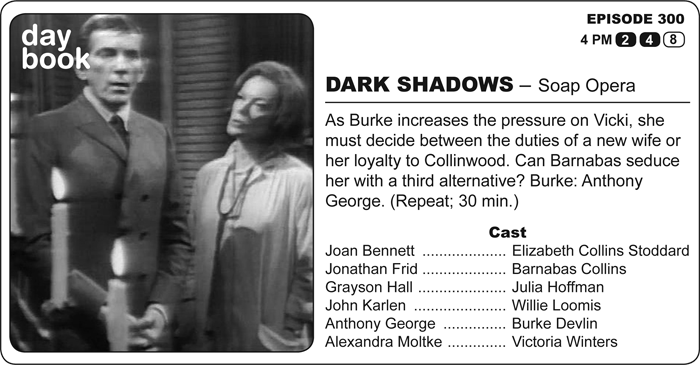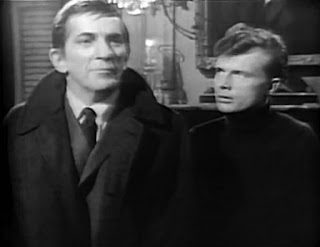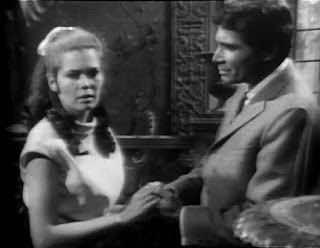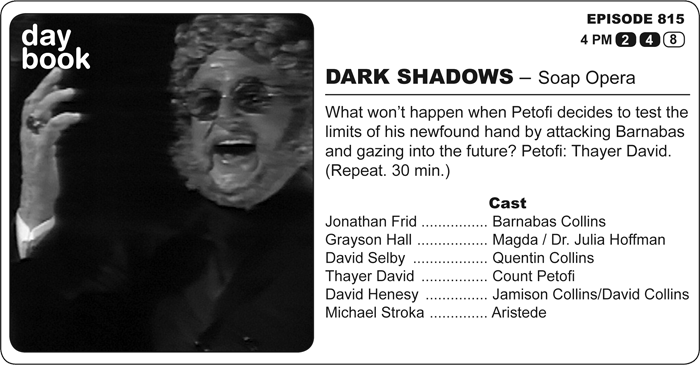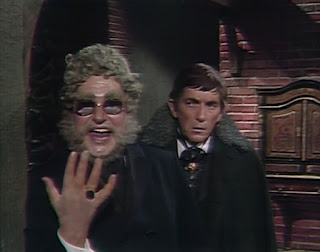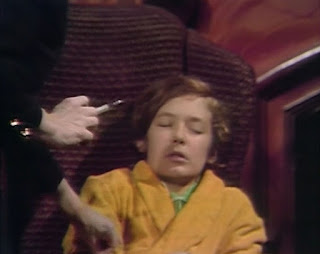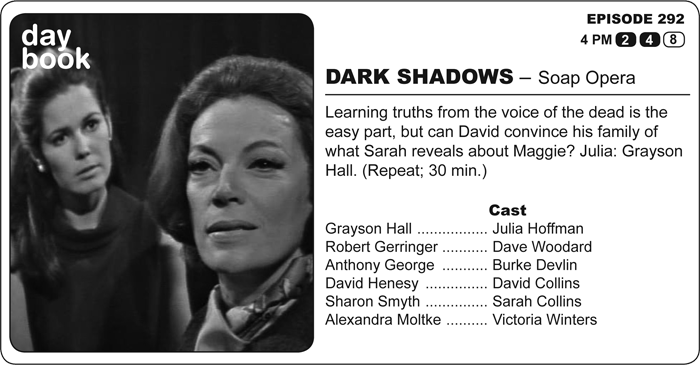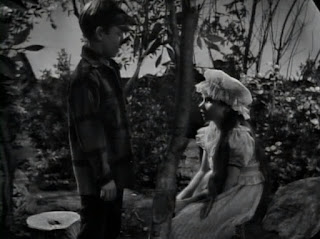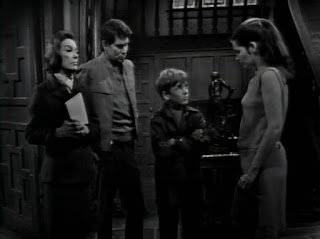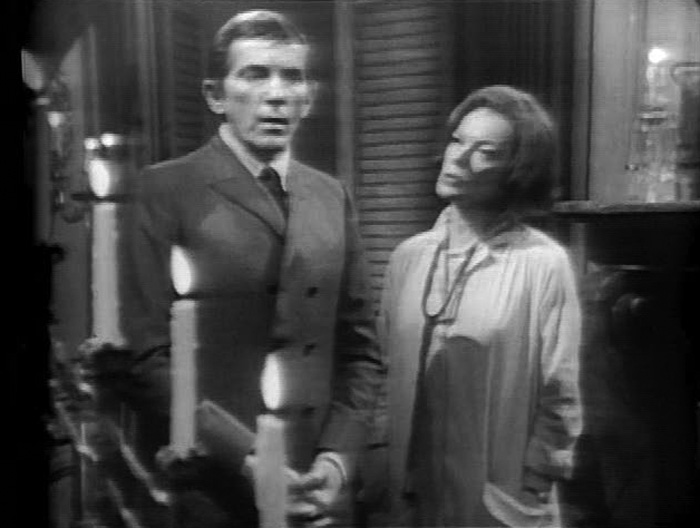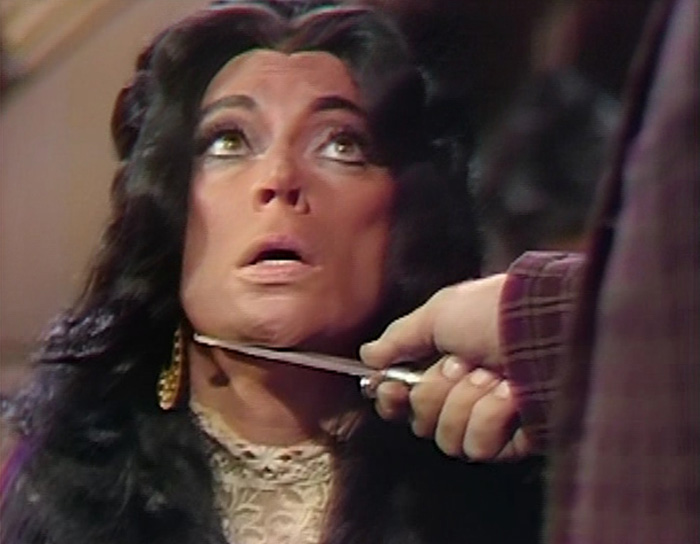By PATRICK McCRAY
Aug. 8, 1966
Taped on this date: Episode: 41
Sam contemplates his sketch of Burke when the phone rings. It’s Roger, asking if he’s alone.
Roger is worried about his drink with Bill Malloy… no letter will protect him. Sam hangs up on Roger and then tears up the sketch of Burke. Liz enters the drawing room and Roger brags about preventing Burke from meeting up with Carolyn by intervening with her ring gambit. They compare what they did with inheritances. Roger enjoyed his, but Liz used hers to maintain the company. And why didn’t Roger mention Ned’s call? She needed his advice, but is coy about why. She says she’s more concerned about Roger than Ned. Maggie arrives at the cottage and a tortured Sam asks why she wouldn’t let him run away. She assures him that they’ll lick ‘em, yet. Maggie tries to get him to talk, but he demurs, claiming he’s lost his touch at portrait painting. She says he’s more concerned with Burke. His return has changed everyone. Sam briefly hints that might be the case, but blames the liquor. Maggie asks if this has to do with the ten-year old car accident and Roger Collins. He leaves and she calls Collinwood. Vicki answers, and Maggie asks for Roger. He’s not at work and Maggie doesn’t know where he is. On cue, Roger strolls in. Roger takes the call… and hangs up. Later, Joe calls and Liz is surprised he’s not on a date with Carolyn. Could she be with Burke? Joe is contrite about his drunken confession, either way. At the cottage, Sam in incensed that Maggie called Roger. Later, a furious Roger pounds on the door. They agree on their mutual hate. Roger leaves, swearing that Sam’s boozy weakness won’t take him down. They both plot on each other’s destruction. At Collinwood, Vicki tells Liz she’s going to town and asks Liz to go. Liz, of course, refuses, and Vicki leaves. Liz once again has no success at reaching Ned, but the silence is broken by a drunken Sam, banging at the door.
Because we haven’t lived with these characters for months or years, it’s very difficult to grok an episode where they don’t do much. Later, the show can get away with that. After time and shared experiences, we don’t necessarily come for the story. We tune in to be with old friends. But not… quite… yet. Still, this is a vital episode because it is the first written by playwright
Francis Swann. So what? After all, the name does not resonate like Sam’s or Gordon’s. Yes, yes, we know. Nevertheless, this is the first author of the show other than
Art Wallace. With that, it may temporarily lose some edge (despite Sam’s booziness), but it will gain that rock band synergy of Hall, Russell, Sproat, and the rotating support team. Swann was a Broadway playwright (
OUT OF THE FRYING PAN) and a prolific writer in the early days of television.
(Episode 31 airs on this date.)
Aug. 8, 1967
Taped on this date: Episode: 300
Julia enters as Vicki happily awaits Burke. Vicki asks her about her dream of the prior night; someone was in her room, she was in danger, but was unafraid. How odd. She thinks someone actually was in her room because the lid of the music box was open and it was playing. The suggested intrusion disturbs her. Julia suggests she did it half-asleep. Liz enters, remarking that Julia’s doing a lot of research at the Old House. Julia exits and Liz says that Burke’s made a firm offer on Seaview. Both are pleased. At the Old House, Barnabas awakens and asks for Willie. Barnabas orders Willie to spy on Vicki and Burke as closely as possible. Is Barnabas afraid of losing her to Burke. Willie says it’s inevitable, and Barnabas threatens him with his life for such opinions. Later, Julia reports to Barnabas that his cure is coming along. He now has a normal heartbeat. He is skeptical, but wonders what a normal man’s life would be like. He will be able to give and accept love. Julia must cure him, but Barnabas must cooperate. She accuses him of being in Vicki’s room. Barnabas admits to temptation, but nothing happened. Julia emphasizes that there must be no next time. He chafes at taking orders. Neither Julia nor he can afford the questions. He agrees to stay away from Vicki. The doctor and he must learn to trust each other. Later in the garden, Burke and Vicki end their date making out. Burke has much to say, and waited until they were alone. He reveals that he’s buying Seaview. For her. For them. He loves her and pops the question. She’s surprised. She loves him, but is torn. She’d have to leave the Collins family. She needs time to think. He’ll ask every day until she breaks down and says yes. She’s wanted an identity, and her search will be over as “Mrs. Burke Devlin.” Meanwhile, Willie sees all. In the drawing room, Liz and Barnabas speak of his future prospects in business. He asks about the sale of Seaview. It’s a shame to have it out of the family. Liz suspects it’s for Burke and Vicki. Liz supports the idea of marriage. Barnabas is uneasy, but denies it. Willie and Barnabas meet at the Old House, and he reports the proposal. She needs time to think, but Willie seems sure she’ll accept. Barnabas vows there will be no marriage. Devlin must die!
Three words: Feminist Field-day. I’m a terrified, Don Knotts-ish coward, hiding under my covers for fear that hooded, Third Wave Feminists will storm in with a giant syringe and extract my mojo, just like Dr. Evil did to Austin Powers in the second documentary… and even I am bewildered by the 60’s attitude that Vicki’s marriage would necessitate her leaving her job at Collinwood. The assumption is that she’s immediately supposed to become a baby factory for Burke. Very alien to today’s eyes and something that dates the show far more than the costumes. Just as significant is the conversation that Barnabas and Julia have about what life will be like when he’s a “normal” man with no secrets… someone who can “love like a normal man.” Okay. New York. The Sixties. The theatrical arts. Haven for confirmed bachelors. Wallace and I have written about this regarding the show before in separate essays. Secret identities. Living in various closets. The family can never know. Tortured yet compulsed. If you see their real self, you’re horrified. Etc, etc. So, yeah, there’s that.
(Episode 292 airs on this date.)
Aug. 8, 1969
Taped on this date: Episode: 820
1897. Petofi visits Charles Delaware Tate, who is again painting his ideal woman again and again… she exists to him, the only thing in the world that’s his. Petofi has a special commission for him. Hearing the details, Tate says it’s too grisly. Petofi says that no one will be hurt, and that he will be back at noon. Shaw comes back to his hotel room to find Amada packing. She can take no more of Trask. But Tim needs her. She feels used, but he reminds her that he pays her well. She says she’s changed since New York. All Tim needs is one more day and one more job. Amanda agrees. She is to meet a certain Count Petofi. At the mill, Magda seeks Petofi’s help. A note says, “Between life and death, there is no room for a flea to jump.” It is a gypsy warning she’s received. He knows the gypsies are coming and will do nothing. It will attract the gypsies to him. Magda cannot betray him; he casts a spell to make it impossible for her to speak or write his name. She leaves as Amanda leaves, saying that Tim has sent her. Petofi immediately sees that she is the woman Tate painted. But Tate’s name means nothing to her. She feigns a past in New York. She wants Petofi’s talisman so that he may have his revenge and they may leave, in love. He reveals that the “talisman” is his hand, and she may not have it. Petofi sends her away with a message. He has good taste in enemies and women, but no sense of strategy. Magda returns to a ransacked Old House. King Johnny of the Gypsies is in the house! If she returns the hand and does not deceive them, he will reduce her punishment. However, she will still stand trial for Julianka’s death. She says she cannot get the hand and he should kill her now. He encourages her to look. At the Inn, Amanda finds that Tim is motivated for revenge on Trask because of his responsibility for the death of a woman he loved. She agrees to stay, but she begs him to stay away from Petofi. His questions of her past frightened her; beyond two years back, she knows nothing. At the Old House, Petofi’s spell silences Magda, despite King Johnny’s blows. She is powerless. In the chaos, he finds the hand’s box. Somehow, the hand is within it!
Every episode at this stage of 1897 is a giddy gift, making the Petofi Days an embarrassment of riches. Gypsy kings and mythology! Roma justice! Women created out of thin air, and a hand that can be in two places at once. King Johnny Romano is played by
Paul Michael, who also lends Jeff Clark the boat he uses to be all herotastic in HOUSE OF DARK SHADOWS. He was from Providence, RI, which is
H.P. Lovecraft country and pretty close to Newport, the home of Seaview Terrace… the photo model for the original Collinwood. His was a rich and interesting film career, including an appearance in the haunting PENNIES FROM HEAVEN and blows a huge puff of smoke at Jerry in the
SEINFELD episode, “The Maestro,” where he plays Ciccio.
(Episode 815 airs on this date.)


